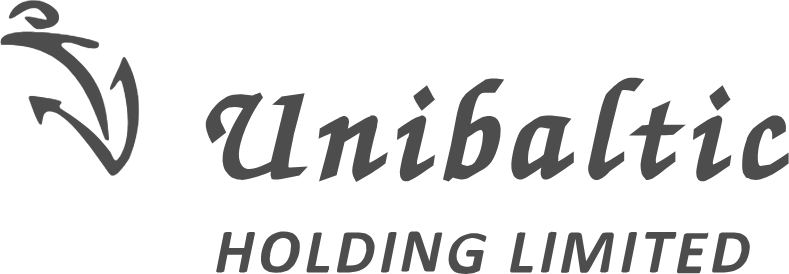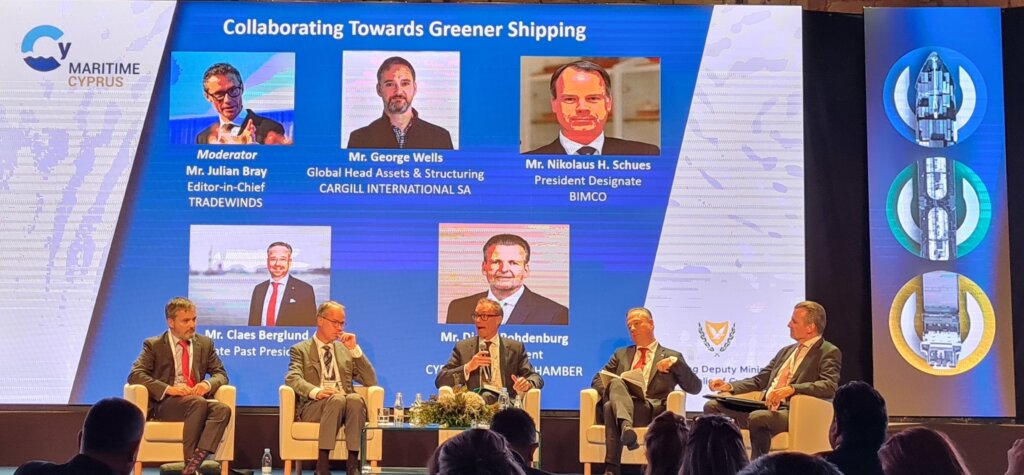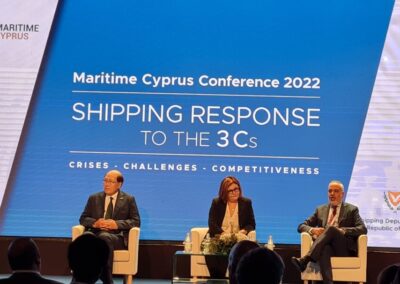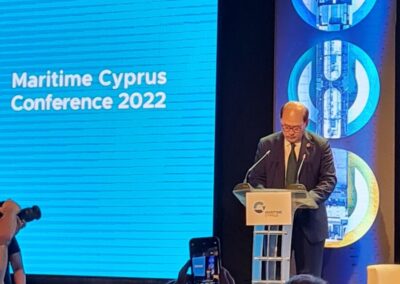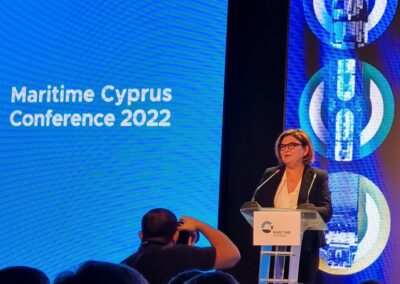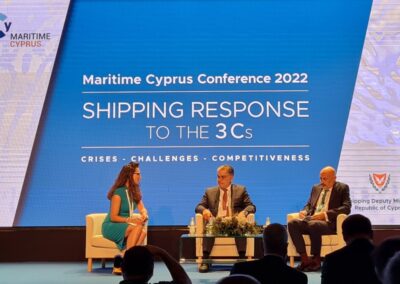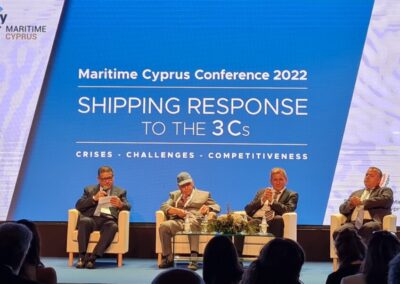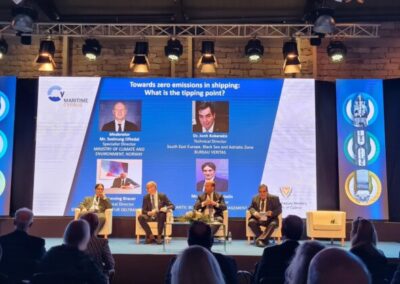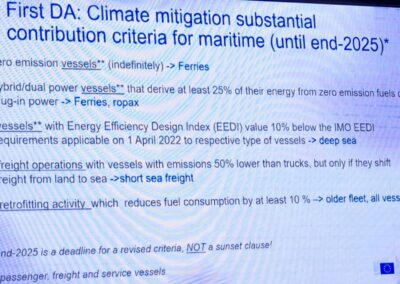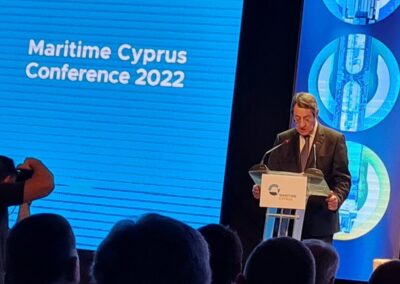“Maritime Cyprus 2022” Conference started on 10th of October 2022 at the Carob Mill Conference Centre in Limassol. Our organisation was represented by Mr. Adam Barecki. Three days event was organized in partnership by the Shipping Deputy Ministry of the Republic of Cyprus, the Cyprus Shipping Chamber, and the Cyprus Union of Shipowners. This year’s conference theme is „Shipping’s Response to the 3 Cs – Crises – Challenges – Competitiveness”.
The conference was opened by Mr. Liana Charalambous Tanos, Chair of the Conference and Acting Permanent Secretary of the Shipping Deputy Ministry. The Chair of the Conference marked the event as an opportunity to exchange views on critical challenges faced by the international shipping industry.
Then the Chair invited the President of the Republic of Cyprus, Mr. Nicos Anastasiades, on the stage, who delivered the opening address. Mr. Anastasiades referred to Cyprus’ long-term strategy for shipping: “SEA Change 2030”. The President emphasized that Cyprus supports the shipping industry in its transition to a green and digital shipping by providing tax incentives, encouraging the use of alternative fuels by Cyprus flagged ships and providing funding to promote innovation. The President also referred to the efforts of the Shipping Deputy Ministry to promote maritime professions and gender equality in shipping, as well as the immediate actions taken by Cyprus to respond to the COVID-19 pandemic, and the practical measures initiated by Cyprus to help the seafarers affected by the war in Ukraine.
The first panel discussion, themed “Is the Regulatory framework ready to respond to the 3 Cs?”, was moderated by the Shipping Deputy Minister to the President, Mr. Vassilios Demetriades. The panel included Mr. Kittack Lim, Secretary General, International Maritime Organization and Ms. Adina Vălean, Commissioner for Transport, European Commission. Mr. Lim discussed how regulating authorities both globally and regionally must work together to face common challenges. Ms. Vălean agreed, highlighting how European logistic chains have been resilient and adaptable, despite the recent energy crisis and war in Ukraine which forced the community to rethink main transport corridors. The panel referred to the COVID-19 pandemic, the war in Ukraine and the challenges of decarbonization and digitalization, and how acting together supports the industry’s safety, security, and efficiency. Further, the discussion focused on whether the emission reduction targets for 2030 and 2050 are sufficiently ambitious, or in need of re-evaluation. Speakers highlighted how regulators can provide various incentives to encourage the use of low and zero carbon fuels and technology, to reduce emissions to achieve these targets.
After the first panel discussion, a keynote speech on „Navigating the new normal” was given by Mr. Ben Nolan – Managing Director, Maritime, Rail & Energy Infrastructure, Equity Research, at Stifel Financial Corp – on the outlook for shipping segment demands. He highlighted how, despite economic uncertainty, investment in the energy transition has not slowed, accelerating progress for hydrogen and carbon capture, among other solutions.
The second panel discussion, “Is the International and EU shipping industry ready to respond to the 3 Cs?”, was moderated by Ms. Amie Pascoe, Director at BLUE Communications. The panel included Mr. Themis Papadopoulos, Vice Chairman, International Chamber of Shipping and Mr. Philippos Philis, President, European Community Shipowners’ Associations. Mr. Philis focused on the importance of not underestimating the global decarbonization challenge, while Mr. Themis Papadopoulos emphasized the essential need for investment in renewable energy generation to meet growing demand.
The third panel, “The Role of Shipowners: Towards a sustainable, safe and resilient industry” was moderated by Mr. George Mouskas, Vice President of the Cyprus Union of Shipowners. The panel included Mr. Andreas Hadjiyiannis, President of the Cyprus Union of Shipowners, Mr. George Procopiou, Chairman of Dynacom Tankers Management Ltd, and Mr. Polys V. Hajioannou, CEO of Safe Bulkers Ltd. Mr. Hadjiyiannis initiated strong debate with bold statements on how differently shipping operates to other industries and how the EU ETS does not reflect shipping operations. Mr. Procopiou highlighted that fuel is the biggest cost to shipowners and global interests must be aligned to protect the environment, while optimizing energy use through available technologies and future fuels. In addition, Mr. Polys V. Hajioannou marked the importance of maintaining competitive cargo prices while meeting regulation.
The fourth and final panel considered the topic “Collaborating Towards Greener Shipping”. Mr. Julian Bray, Editor-in-Chief, TradeWinds, was the moderator for this discussion with the panel comprising of Mr. George Wells, Global Head Assets & Structuring, Cargill International SA, Mr. Nikolaus H. Schües, President Designate, BIMCO, Mr. Claes Berglund, immediate Past President, ECSA, and Mr. Dieter Rohdenburg, Vice President, Cyprus Shipping Chamber and CEO, Intership Navigation Co. Ltd. Mr. Schües opened discussion with the belief that the cost of decarbonization would not be achieved alone. With consumers driving demand, Mr. George Wells emphasized that the cost must be passed through the entire supply chain. The panel also discussed green fuel supply. Mr. Rohdenburg underlined that opportunities are there to be part of the green fuel infrastructure, and then to create demand. In response, Mr. Berglund raised the trajectory of LNG as a fuel, and how the industry can learn from the process of introducing a new fuel to the industry.
The first session of the conference’s day two started with the panel “Towards zero emissions in Shipping: What is the tipping point?”, and was moderated by Mr. Sveinung Oftedal, Specialist Director, Norwegian Ministry of Climate and Environment. On the panel was Dr John Kokarakis, Technical Director, South East Europe, Black Sea and Adriatic Zone, Bureau Veritas, Dr Henning Brauer, Technical Director, GEFO GmBH and Mr. Panos Zachariadis, Technical Director, Atlantic Bulk Carriers Management Ltd. Panelists discussed incoming changes to the regulatory landscape, and its effects on shipping as the industry transitions towards sustainability. Conversation largely focused on the alternative fuels under consideration, with the panel exploring the viability of each to various areas – and the need for these solutions to be compatible with existing port infrastructure and ships. Methanol was highlighted by Mr. Zachariadis as a strong candidate for bulk, as well as other segments. Dr Kokarakis championed LNG as a viable solution, available today, explaining how methane slip is actively being reduced. Regulation was also discussed and the value of mid-term measures but also market-based measures. Dr Brauer and Dr Kokarakis both commented that regional measures, such as those imposed by the EU, are unnecessary in the short term, and believe the International Maritime Organization (IMO) should be the primary regulatory body. This, they said, would ensure global consistency. Mr. Zachariadis, however, emphasized the value in EU measures, which encourage the IMO to further develop their regulations package. It was agreed that industry-wide collaboration is required to ensure effectiveness of current and future regulations.
The second panel focused on “Taxonomy in Shipping – A panacea or a detour to sustainable/green finance?” Mr. Nicolas Bornozis, President and CEO, Capital Link, Inc was moderator for the session. The panel included Ms. Fotini Ioannidou, Deputy Director Waterborne Transport, Head of Unit Maritime Safety, DG MOVE, European Commission, Ms. Katalin Dobranszky, Senior Director, Innovation, Finance and Fiscal Affairs, ECSA, Mr. Thanasis Antonakis, CFO, Safe Bulkers, Inc, and Mr. Sean McLaughlin, Strategy Consultant, Houlder Ltd. The panel covered how taxonomy does, and will continue to, affect investment in technologies and processes that form a key part of driving sustainability in shipping. Ms. Ioannidou opened the panel with a short, clarifying presentation on current EC taxonomy legislation, which covers every sector – including maritime transport. The presentation highlighted the EC’s objectives to become climate neutral continent by 2050, a goal which requires huge investment not only in shipping, but all transport sectors. Ms. Ioannidou concluded that a key objective is to develop an international solution through close collaboration with other regions. Pointing to the industry’s preparedness, Mr. McLaughlin commented on the lack of awareness among shipowners of the importance of taxonomy. “The industry needs to take note, and action, on regulatory reporting, to ensure success. Waiting for the regulatory landscape to settle is not a viable or sustainable strategy,” he said. Driving his point home, he brought the audience’s attention to the importance of retrofitting, and the value the variety of solutions currently available to offer shipping in efforts to reduce the environmental impact of the 60,000 vessels currently in operation. Mr. Antonakis share the same vision; the shipowners shall do steps to make the shipping greener. He added that, to do it, the shipping industry should have more support from the EU. In his opinion, the current shape of the taxonomy does not contribute to this at all. As an example, he mentioned the investments made by Safe Bulkers to install scrubbers to clean the exhaust gases. It cost a lot of money, the goal was laudable, but the company could not count on taxonomy-based financing. The taxonomy is based on the „cargo principle” rule according to which ships that can be used to transport fossil fuels are excluded from this regulation. In his opinion, this causes a decrease in the competitiveness of companies that have collapsed in the EU. Companies that will not be able to count on funding in the EU will look for funding outside Europe, which will result in an outflow of these entities abroad.
The Maritime Cyprus 2022 conference continued 12th. Opening discussions, Mr. Anders Hvid, Co-founder, DareDisrupt explored the topic “Leveraging digital transformation and innovation for a brighter future in shipping”. He noted several observations in shipping and energy, where an accelerating level of innovation will see complete transformation of certain sectors over the next decade. One example was the rise of solar energy, and its ever-decreasing cost which will cement renewables as reliable, affordable, and sustainable sources of energy. Commenting on the power of data in shipping, Mr. Hvid said “The green transformation is the biggest challenge we have ever faced, and digitalization is a mighty, powerful tool we can use to solve it.”
Discussions were continued with the panel “Automated and autonomous Shipping: Is the pace fast enough?” with moderator Ms. Despina Panayiotou Theodosiou, President, WISTA International and CEO, Tototheo Maritime. The panel included Ms. Maja Markovčić Kostelac, Executive Director, European Maritime Safety Agency, Mr. Yi Han Ng, Director of Innovation, Technology & Talent Development, Maritime and Port Authority of Singapore, Mr. Mark O’Neil, President, InterManager and Dr Evangelos Ouzounis, Head of Policy Development and Implementation Unit, European Union Agency for Cybersecurity. The panel agreed that use of automation in shipping is showing much promise, with development accelerating in areas such as artificial intelligence. Participants discussed the potential of technology but warned that human error was a risk factor that the industry needs to consider. Mr. Mark O’Neil explained automation would always require people power either onboard or onshore and semi-automation is the future. He continued to highlight how regulatory progress needed to support automation. The discussion also covered the value of protecting the handling and collection of data and how sharing data can be a conflict – both how it might help the maritime industry but also help its progress. The panel closed with comments on how the industry needs to prepare for developments in automation, with training noted as critical to success, particularly as maritime technologies and alternative fuels develop.
Following the first panel, the highlight of the day focused on the question “Is Seafarers’ welfare and rights in jeopardy? Leading discussions, Captain Lasota focused on the non-criminalization of seafarers. The moderator was Dr Iliana Christodoulou-Varotsi and panelists included Mr. Stephen Cotton, General Secretary, International Transport Workers Federation, Mr. Jan Meyering, Joint Managing Director, Marlow Navigation Co. Ltd, and Mr. Guy Platten, Secretary General, International Chamber of Shipping.
Captain Lasota gave a heartfelt account of his personal experiences, which involved himself being unjustly prosecuted and jailed for two years for a narcotics case. He called for ongoing discussion around, and development of legislation relating to, seafarer rights. Panelists explored the state of seafarer rights within the context the regulatory landscape, emphasizing the importance of tackling the challenge head on to avoid further suffering by keyworkers forming the backbone of the shipping industry. The panel also outlined what changes could be made to rectify the current seafarer shortage including improved connectivity, investment in programs geared towards increased diversity, equity and inclusivity and encouraging more female involvement in the industry.
The final panel of the day explored the topic of “Challenging the Communication Challenge”, which was moderated by Ms. Liana Charalambous Tanos, Conference Chairwoman, Permanent Secretary, Shipping Deputy Ministry. The panelists for this discussion were Mr. Stuart Neil, Director of Strategy and Communications, International Chamber of Shipping, Ms. Anna Vourgos, President, WISTA Cyprus, Mr. Sean Treacy, Senior Vice President Hotel Operations, Royal Caribbean International and Ms. Michelle Wiese Bockmann, Markets Editor/Analyst, Lloyd’s List. Ms. Liana Charalambous Tanos opened the panel by questioning how shipping is presenting itself to the public. In response to this, Ms. Michelle Wiese Bockmann highlighted the abundance of room for improvement in how shipping approaches communications. Citing the Ever Given’s obstruction of the Suez Canal in 2021, she highlighted the situation as a missed opportunity for shipping leaders to shift the narrative and highlight the importance of the sector to the global supply chain. Ms. Vourgos encouraged leaders of the sector to adjust the tone, increasing promotion of the industry to the public, governments and external regulatory bodies and financiers. “We are not a visible industry, but we need to be,” she said. The panel agreed the industry needs to be self-critical and professionalize how it communicates. “When headlines hit the Financial Times front page, the government acts,” he said. Joining the stage for the final panel, Cyprus Shipping Deputy Minister to the President, Mr. Vassilios Demetriades, communicated his support for the drive for external communication outside of the industry. He ended: “Strong external relations will ensure we are visible, and it will have positive results”.
